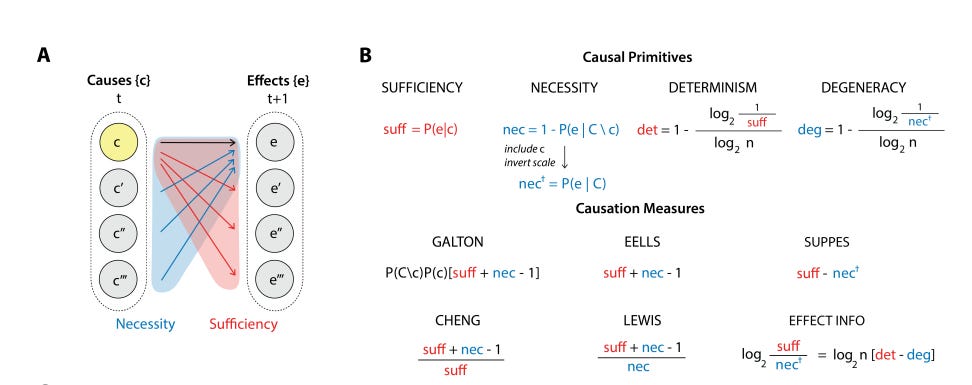You will forgive me if this post is more technical than usual. I try to leave out math, knowing how confusing it can be. But here it is necessary.
The Review
I was asked to review the paper "Causal emergence is widespread across measures of causation" by Renzo Comolatti and Erik Hoel.
It begins like this: "While causation has historically been a subject of philosophical debate, work over the last few decades has shown that metaphysical speculations can be put aside in favor of mathematical formalisms."
No they can't. How could they be? You must first have a philosophy of cause before you can represent it mathematically. You can write down any number of mathematical equations, but the act of mapping them onto (what you at least perceive as) Reality, philosophy enters necessarily. It is a philosophy to say equations represent Reality, in whatever way they do.
Skipping the intro, jump to the meat. As usual (in the field), they posit $latex \Omega$, the "set of all possible occurrences." This is conditional on whatever assumptions are made to limit this set (examples below). Then comes their philosophy, masked as mathematics: "we can consider causes $latex c \in \Omega$ and effects $latex e \in \Omega$, where we assume causes <em>c</em> to precede effects <em>e</em>". That "precede" can be dicey, for some causes and effects can be simultaneous (hit your scroll bar for an example). They appear to have in mind time series-like causes and effects only.
Well, dear Substack reader, it is here that I must leave off. You see the strange markings like “$latex …” and so on. These are rendered in Wordpress as equations, which can’t be seen here.
However, they can be see at the post at my place.
I apologize for this. Most of you won’t want to click over. The piece is technical and philosophical on the nature of cause in probability models. However, a few of you may want to, hence this teaser introduction.
Thanks.





Economists should listen, and start their papers in a similar fashion:
"While incentives have historically been a subject of economical debate, work over the last few decades has shown that such unpleasant aspects of the human condition can be put aside in favor of mathematical formalisms."
Thank you for your commitment to helping us non-statisticians see through the fog of numbers manipulation.
But this one! “You don’t need a philosophy to determine causation,” they say? That can only be true for the philosophy-deniers. You may not care about philosophy, but it cares about you! Now, you’ve said that in the language of math? Fascinating.